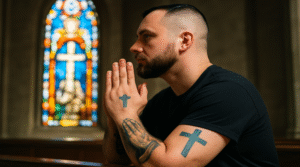Tattoos have long been a form of self-expression, carrying personal meaning and cultural significance for many individuals around the world. In recent years, religious tattoos have gained popularity as a way for believers to display their faith visibly and permanently. These tattoos often feature symbols, scriptures, or imagery linked to various spiritual traditions, serving as a constant reminder of their beliefs.
Despite their popularity, there is ongoing debate about whether religious tattoos are primarily acts of devotion or if they sometimes serve as cultural fashion statements. Some argue that these tattoos reflect deep spiritual commitments, while others view them as a way to connect with cultural identity or aesthetic trends. Understanding the motivations behind religious tattoos can reveal much about individual identity and societal influences.
Historical Significance of Religious Tattoos
Throughout history, many cultures have used tattooing as a form of spiritual or religious expression. For example, the ancient Egyptians inked symbols believed to offer protection and guidance in the afterlife. Similarly, Polynesian societies employed intricate tattoo designs to signify social status, spiritual beliefs, or tribal affiliations.
In the context of Western history, religious symbols, such as crosses or saints, have appeared in tattoo art since the 19th century. These designs often served as markers of faith during times of hardship or as symbols of pilgrimage. Over centuries, religious tattoos have maintained their importance as markers of identity, faith, and cultural heritage.
Today, religious tattoos can be seen globally, blending traditional iconography with contemporary styles. This historical continuum highlights how tattoos have served as a medium for expressing spirituality and connecting with ancestral traditions.
Types of Religious Tattoos
Religious tattoos vary widely depending on their cultural and spiritual origins. Common types include Christian crosses, images of saints, or biblical quotes, often inked by individuals of Christian faith. These symbols serve as declarations of belief and spiritual protection.
In Hinduism and Buddhism, images of deities, mandalas, or sacred symbols like Om are popular choices. These tattoos often symbolize spiritual growth, enlightenment, and devotion. Many wear them as reflections of their religious journey or to invoke divine blessings.
Islamic tattoo art tends to be more conservative, often focusing on calligraphy of Quranic verses or the names of Allah. While some Muslims abstain from tattoos altogether, others incorporate sacred scripts as a form of spiritual expression, demonstrating the diversity of ways faith is visually represented.
Motivations Behind Religious Tattoos

The reasons individuals choose to get religious tattoos are varied and deeply personal. For many, these tattoos are acts of devotion, serving as a visible Testament to their faith and moral values. They may have obtained their tattoos during a significant spiritual milestone or as a promise of lifelong commitment.
Others view religious tattoos as a source of comfort and strength. In times of hardship or loss, these symbols can offer reassurance and a sense of divine presence. For some, they serve as daily reminders to live according to their spiritual principles.
Additionally, cultural identity influences many to get religious tattoos. They may see their tattoos as a way to honor heritage or connect with a larger community who shares similar beliefs. This blending of personal faith and cultural tradition makes religious tattoos a multifaceted form of self-identity.
Ethical and Social Considerations
The choice to tattoo religious symbols doesn’t come without ethical questions. Some argue that religious imagery should not be turned into fashion statements or aesthetic decoration, as it may diminish their spiritual significance. Respecting the sacred nature of these symbols remains a concern for many believers.
There is also social scrutiny surrounding religious tattoos, especially if they challenge cultural norms or provoke misunderstandings. In some communities or religious groups, tattoos are still viewed as controversial or taboo, which could lead to social exclusion or judgment.
Despite these challenges, many individuals see their religious tattoos as a personal expression of faith, regardless of societal perceptions. Navigating the ethical landscape involves balancing respect for religious symbols with personal freedom of expression.
Cultural Perspectives on Religious Tattoos

Different cultures approach religious tattoos with varying attitudes. For example, in many indigenous societies, tattoos are integral to rites of passage and spiritual identity. They are considered sacred and are often restricted to certain community members.
In contrast, Western cultures have seen a rise in religious tattoos as part of mainstream fashion, sometimes detached from their original spiritual meanings. This trend raises questions about cultural appropriation and the commercialization of sacred symbols.
Furthermore, certain religious traditions discourage or forbid tattoos altogether, emphasizing spiritual purity and bodily sanctity. These diverse perspectives highlight how cultural values shape the perception and significance of religious tattoos globally.
Modern Trends and Styles
Contemporary tattoo artists have evolved religious tattooing into an art form that combines tradition with innovation. Techniques like realism, watercolor, and minimalism have been applied to religious symbols, making them more personalized and expressive.
Many young people opt for modernized interpretations, such as geometric patterns around sacred symbols or abstract representations of faith. This fusion of styles makes religious tattoos more accessible and appealing across different demographics.
Additionally, temporary or semi-permanent ink options are increasingly available, allowing individuals to explore their spiritual expression without lifelong commitment. Modern trends continue to diversify the ways faith manifests through body art.
Conclusion
Religious tattoos serve as powerful expressions of personal faith and cultural identity, reflecting individual beliefs and spiritual journeys. While they symbolize devotion for many, they also raise important questions about respect, tradition, and social perception. The ongoing dialogue surrounding religious tattoos highlights their complex role in connecting individuals with their spirituality and heritage.
Ultimately, religious tattoos remain a personal choice, infused with deep meaning or cultural significance. Whether viewed as acts of devotion or cultural expression, they continue to be a compelling way for people worldwide to embody their beliefs and values visually and permanently.







